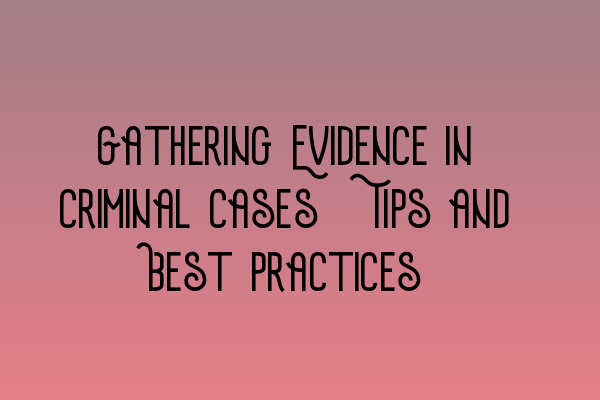Gathering Evidence in Criminal Cases: Tips and Best Practices
When it comes to criminal cases, gathering evidence is of utmost importance. It can make or break a case, and it plays a crucial role in determining the outcome. As a criminal solicitor, it is essential to understand the best practices and tips for gathering evidence effectively.
The Importance of Evidence
Evidence forms the foundation of any criminal case. It provides credibility to the legal arguments, supports the prosecution or defense, and helps the court make an informed decision. Without proper evidence, a case can fall apart, leading to unjust outcomes.
As a criminal solicitor, your goal is to present a strong and compelling case on behalf of your clients. To achieve this, you need to gather evidence that is admissible in court and supports your legal arguments. Here are some tips and best practices to help you gather evidence effectively:
1. Identify Key Witnesses
Witnesses can provide valuable testimony and corroborate your client’s version of events. It is crucial to identify and interview potential witnesses early on in the case. Take detailed statements, gather contact information, and assess their credibility. This will help build a strong defense or prosecution strategy.
In some cases, witnesses may be hesitant or fear repercussions. It is your role as a solicitor to build trust, assure their safety, and convince them of the importance of their testimony. If necessary, consider seeking witness protection measures.
2. Obtain Documentary Evidence
Documentary evidence can include records, photographs, videos, emails, text messages, financial statements, and more. Collect any relevant documents that support your client’s case. Ensure that the documents are authentic, properly obtained, and comply with the rules of evidence.
Organize the documents in a logical manner, and create an index or summary for easy reference during trial. This will help you present the evidence effectively and highlight key points to the court.
3. Expert Witnesses
In certain cases, expert witnesses can provide specialized knowledge or opinions that are crucial to the case. They can help interpret complex evidence and explain technical aspects to the court. Identify and engage expert witnesses who can provide reliable and relevant testimony.
Ensure that the expert witness is qualified, unbiased, and has the necessary expertise in the specific field. Their opinion should be based on sound scientific principles or professional standards. Expert witnesses can greatly strengthen your case when utilized effectively.
4. Consider Forensic Evidence
Forensic evidence, such as DNA analysis, fingerprints, ballistics, or toxicology reports, can be highly persuasive in criminal cases. It can provide scientific proof of a person’s involvement or innocence. Collaborate with forensic experts to collect, preserve, and analyze relevant evidence.
Adhere to proper chain of custody procedures to maintain the integrity of the evidence. Conduct regular follow-ups with forensic laboratories to ensure timely analysis and documentation. Utilize forensic evidence strategically to strengthen your legal arguments.
5. Conduct Thorough Investigations
Gathering evidence is intrinsically tied to conducting thorough investigations. Explore all avenues, interview potential witnesses, review CCTV footage, visit crime scenes, and collaborate with law enforcement agencies. Dig deep into the facts of the case and uncover any hidden evidence that may be critical to your client’s defense or prosecution.
Conclusion
Gathering evidence in criminal cases requires careful attention to detail, effective communication skills, and a thorough understanding of the law. By following the tips and best practices outlined above, you can ensure that you gather strong and admissible evidence to support your clients’ cases.
Remember, evidence is the backbone of a criminal case, and it can significantly impact the outcome. So, prioritize the gathering of evidence, leverage the expertise of witnesses and experts, and conduct thorough investigations to build a compelling case for your clients.
For more information on preparing for the SQE exams, you can refer to the following related articles:
- SQE 1 Practice Exam Questions
- SQE 1 Practice Mocks FLK1 FLK2
- SQE 2 Preparation Courses
- SQE 1 Preparation Courses
- SRA SQE Exam Dates
